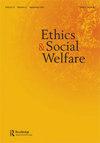Co-optation, Complicity, and the ‘Helping Relationship’ in Sex Work
IF 0.9
Q4 SOCIAL WORK
引用次数: 0
Abstract
This special issue complicates the prevailing discourse and public policy surrounding sex work. The authors raise questions about sex workers’ personal agency, environmental and individual-level factors, and new policy regimes, such as hybrid penal and therapeutic approaches. This issue weaves traditional academic genres with research, teaching, and practice reflections. The diverse voices and perspectives in this special issue collectively shed light on the changing discourse, policy, and day-to-day landscape of sex work in a variety of contexts. Contributions focus on several different jurisdictions, offering contextual perspectives on both the macro and micro level experiences of sex work, and the ‘helping relationships’ that contribute to structuring understandings of sex work. Authors in this volume employ different terminology (e.g. ‘sex work,’ ‘prostitution,’ ‘sex trade’), reflecting a diversity of context-specific language and viewpoints. However, authors have in common the prevailing perspective that sex workers should be valued and supported. Challenging the influences behind the social construction of sex workers and sex work is a key theme in this special issue, highlighting the importance of centring sex workers’ voices and experiences. Alison Jobe, Kelly Stockdale and Maggie O’Neill examine the implications of stigma for service provision and access to justice for women selling sex in North East England. Centring sex workers’ voices as co-researchers through a peer-led participatory action research methodology, they demonstrate how the design of health services and approaches to justice need to recognise and ameliorate the stigma attached to sex work. Sharmila Parmanand critiques externally imposed constructions of sex work in the context of the Philippines. Contrasting policy approaches to domestic work and sex work, Parmanand draws upon ethnographic research with Filipino sex workers to challenge a false distinction that views domestic work as valuable and virtuous, while sex work is viewed as abusive and bad. The devaluing of sex work as labour, and the lack of recognition of stigma as an obstacle to service provision, represent failures to centre sex workers’ perspectives and experiences in the creation of policy and services. This can be partly addressed through the inclusion of sex workers as researchers and policy-makers, and the Sex Worker Syllabus is an essential tool in achieving this. The interview with co-creaters of the syllabus, Heather Berg, Angela Jones, and PJ Patella-Rey, reflects on the failures that led to the need for the syllabus, and on the process of collating resources on sex work by sex workers, that should be essential reading for ‘helping professionals’ to better understand the needs of the community. Building on the themes of ‘nothing about us without us’ from the Sex Worker Syllabus, authors in this special issue also dive into the complications of community and narrative control. Responses to violence and harm are not only shaped by individuals’ self-defined experiences but stigmas and stereotypes that risk further conflating sex work with sex trafficking. Nili Gesser describes the role of peer support in one group of women navigating substance use and sex work in the Greater Philadelphia area. In their intentional efforts to stop using drugs and性工作中的合作、共谋和“帮助关系”
这一特殊问题使围绕性工作的主流话语和公共政策复杂化。作者对性工作者的个人代理、环境和个人层面的因素,以及新的政策制度,如混合惩罚和治疗方法提出了问题。本刊将传统学术流派与研究、教学和实践反思相结合。本期特刊中不同的声音和观点共同揭示了在各种背景下不断变化的话语、政策和性工作的日常景观。贡献集中在几个不同的司法管辖区,提供宏观和微观层面的性工作经验的背景观点,以及有助于构建性工作理解的“帮助关系”。作者在本卷中使用不同的术语(例如“性工作”,“卖淫”,“性交易”),反映了上下文特定语言和观点的多样性。然而,作者们的共同观点是,性工作者应该受到重视和支持。挑战性工作者和性工作的社会建构背后的影响是这期特刊的一个关键主题,突出了集中性工作者的声音和经历的重要性。Alison Jobe, Kelly Stockdale和Maggie O 'Neill研究了在英格兰东北部提供服务和获得司法救助的女性所面临的耻辱。通过同行主导的参与性行动研究方法,将性工作者作为共同研究人员的声音集中起来,他们展示了卫生服务和司法方法的设计如何需要认识到并改善与性工作有关的污名。Sharmila Parmanand在菲律宾的背景下批评外部强加的性工作结构。对比对待家务劳动和性工作的政策方法,Parmanand利用对菲律宾性工作者的人种学研究来挑战一种错误的区分,即认为家务劳动是有价值的和高尚的,而性工作被视为虐待和不好的。贬低性工作作为劳动的价值,以及没有认识到耻辱是提供服务的障碍,都表明在制定政策和服务时未能将性工作者的观点和经验作为中心。这可以通过将性工作者纳入研究人员和决策者的行列来部分解决,性工作者教学大纲是实现这一目标的重要工具。对教学大纲的共同创造者Heather Berg, Angela Jones和PJ Patella-Rey的采访,反映了导致需要教学大纲的失败,以及整理性工作者性工作资源的过程,这应该是“帮助专业人士”更好地理解社区需求的必要读物。基于《性工作者教学大纲》中的“没有我们就没有我们”这一主题,本期特刊的作者还深入探讨了社区和叙事控制的复杂性。对暴力和伤害的反应不仅受到个人自我定义的经历的影响,而且受到污名化和刻板印象的影响,这可能会进一步将性工作与性贩运混为一谈。Nili Gesser描述了同伴支持在大费城地区的一组女性吸毒和性工作中的作用。在他们有意识的努力停止使用毒品和
本文章由计算机程序翻译,如有差异,请以英文原文为准。
求助全文
约1分钟内获得全文
求助全文
来源期刊

Ethics and Social Welfare
SOCIAL WORK-
CiteScore
1.60
自引率
20.00%
发文量
36
期刊介绍:
Ethics and Social Welfare publishes articles of a critical and reflective nature concerned with the ethical issues surrounding social welfare practice and policy. It has a particular focus on social work (including practice with individuals, families and small groups), social care, youth and community work and related professions. The aim of the journal is to encourage dialogue and debate across social, intercultural and international boundaries on the serious ethical issues relating to professional interventions into social life. Through this we hope to contribute towards deepening understandings and further ethical practice in the field of social welfare. The journal welcomes material in a variety of formats, including high quality peer-reviewed academic papers, reflections, debates and commentaries on policy and practice, book reviews and review articles. We actively encourage a diverse range of contributions from academic and field practitioners, voluntary workers, service users, carers and people bringing the perspectives of oppressed groups. Contributions might include reports on research studies on the influence of values and ethics in social welfare practice, education and organisational structures, theoretical papers discussing the evolution of social welfare values and ethics, linked to contemporary philosophical, social and ethical thought, accounts of ethical issues, problems and dilemmas in practice, and reflections on the ethics and values of policy and organisational development. The journal aims for the highest standards in its published material. All material submitted to the journal is subject to a process of assessment and evaluation through the Editors and through peer review.
 求助内容:
求助内容: 应助结果提醒方式:
应助结果提醒方式:


